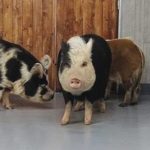Blue Martin once owned a bunny named Bacon.
Now she’s president of Pigsburgh Squealers Rescue, a nonprofit that educates people about miniature pigs and helps find permanent homes for the animals.
Since 2016, it’s placed more than three dozen.
Martin, 29, and her fiance Zack Robinson, 32, recently bought a 25-acre property in Frazer that they’re transforming into a sanctuary and adoption center for the animals. Misinformation about mini pigs — also known as micro-pigs and teacup pigs — often leads to abandonment.
“Pigs grow until they’re 3 to 5 years old,” Martin says. “The peak size for a full-grown mini pig is 80 to 150 pounds. Maybe even 200.”
Because of unrealistic size expectations — propagated by some breeders looking to make big bucks — more than 90 percent of the pets are ditched by their owners. The pigs end up on Craigslist, in animal shelters or set “free.”
A few months ago, a mini pig named Juliet was dumped at a local farm. She was subsequently impregnated by a resident pig and died shortly after giving birth to a passel of homeless piglets dubbed The Shakespeare 11.
While the rescue doesn’t accept surrenders, the group does what it can to help overwhelmed owners by offering home tusk- and hoof-trimming services, short-term foster care and rehabilitation and referrals to area veterinarians who specialize in livestock. They work with national and local rescue organizations, including Beaver County’s Angel Eyes Farm, in emergency situations.
Martin, a postdoctoral biomedical engineer, bought her first pig Sasquatch in 2013. Even with extensive research, the scientist couldn’t find reliable information about mini pigs, which come in a variety of breeds.
Sasquatch was the size of a puppy at first but is now tipping the scales at 100 pounds. Because pigs are herd animals who love company, Martin and Robinson took in a few more.
They all have distinct personalities.
While Sasquatch is a bit ornery, Phantom is a regular ham and serves as their “public relations pig” at educational events. Maui throws toddler-style temper tantrums and Mokele, a Red River hog, loves belly rubs. When the weather is nice, they root around in a backyard pen. Inside, they have free rein of the sprawling basement, which, aside from a network of muddy hoof prints on the floor, isn’t a stereotypical pigsty.
The pot-bellied beasts are relatively clean, can be leashed and litter box trained and eat a diet of pig pellets, table scraps and hay.
Workaholics might be better off getting a fish. Without proper stimulation, pigs become bored and destructive.
Spaying or neutering also is necessary to curb bad behavior, but the surgery is expensive and risky. Pigs don’t do well with anesthesia.
Jamie Paustenbaugh impulsively bought a mini pig one afternoon while visiting a livestock swap at Tractor Supply in Harrison.
“It wasn’t until I got home and brought Holly-Wood into the garage in her pink dog crate that I realized I had no idea what to do with her,” says Paustenbaugh, who lives in South Buffalo with her husband, two children, three dogs and 20 chickens. “Pigs aren’t like puppies that want to jump on you and lick your face. She literally squealed like a pig if you tried to pick her up.”
After a few weeks of awkward cohabitation, the Paustenbaugh family was forced to build a large, outdoor pig pen, complete with heating and lights on their 3.5-acre property. The cozy abode houses Holly-Wood and her piggie pal, Maybelline.
They’re both between 35 and 40 pounds. Paustenbaugh feels misled by the term “mini pig.”
“I was also told they would be under 50 pounds, but they have at least tripled in size since January,” she says. “At this rate, I would doubt they stay under 50.”
Martin and Robinson hear similar stories all the time. They’re slowly building a network of local owners by hosting monthly wine and swine parties. The event soon will be open to the public, so potential pig parents can hear about hog life straight from the horse’s mouth.
At a recent gathering, people enjoyed Chardonnay and snacks as pigs snorted and squealed at their feet, waiting for a crumb — or a whole plate — to drop.











